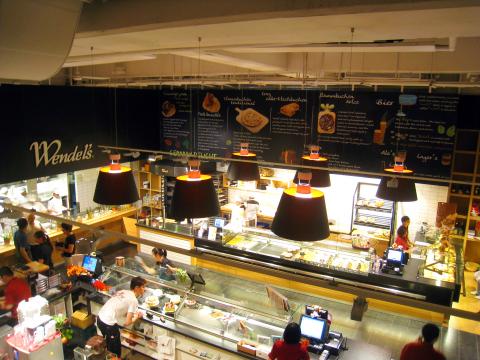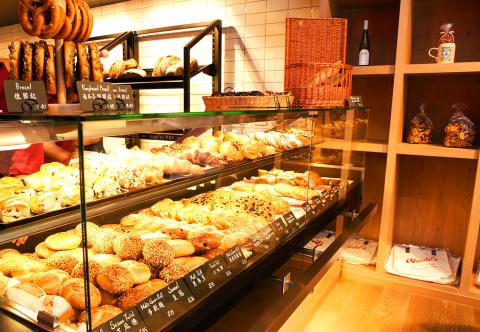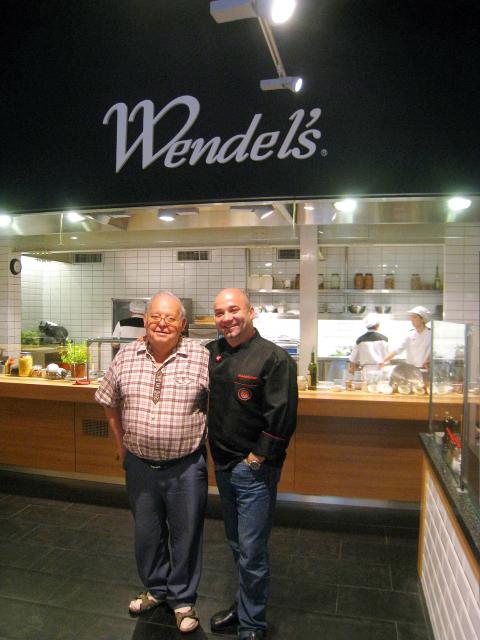Wendel’s Bakery and Bistro, since it was first established in 1999 on Taipei’s Zhongshan North Road (中山北路) Sec 6, has become something of an institution both for foreign and local residents of the city. It is one of only a handful of foreign run and owned restaurants with such deep roots in Taiwan, but as Michael Wendel is also keen to point out, these roots extend all the way back to Germany and the family bakery that opened in 1932. This unusual combination of close ties with the culinary tradition of his home, and his strong bonds with the local community will be celebrated in Essence and Heritage of Culinary Art, an activity organized by the Chinese Gourmet Association (中華美食交流協會) to be held on Friday.
Essence and Heritage of Culinary Art is a panel discussion and cooking demonstration that will feature five pairs of chefs, each of which represent a parent and child transition of culinary art across two generations. Michael Wendel, who will be joined by his father Walter Wendel as one of these five pairs, will celebrate a passing on and a relocation of his family’s culinary tradition.
Carl Lin (林俊鴻), deputy secretary-general of the Chinese Gourmet Association told the Taipei Times in a telephone interview earlier this week that they had selected Wendel in part because of his international reputation and recognized presence in Taiwan, but also, quite simply “because it is such a great story.”

Photo Courtesy of Wendel’s Bakery and Bistro
“Through Michael’s participation in this event, we also hope that other international chefs will realize that Taiwan is a great place to develop their career … Taiwan on the whole is very accepting of foreign traditions and culture, and if they can find the right course, Taiwan offers great potential.”
The Taipei Times caught up with Michael Wendel at his new bistro located in the Neihu Science Park, a venture that represents a new departure and an expansion of his vision, introducing many new dishes, while at the same time cementing an authentic German culinary standard in Taiwan.
Master baker

Photo Courtesy of Wendel’s Bakery and Bistro
“There are quite a few German restaurants in Taipei,” Wendel said, “but this is the only one that is owned and run by a German from the food industry. Many of the other German restaurants are run by people not from the industry, but are opened by people who have come here with a trading company and fallen in love with this country, and have then opened a restaurant to stay here. In Taiwan there is no requirement to obtain certification to be a master in your field (for a chef), so many people like this can open a restaurant. Most of these restaurants are quite home style, and most have a Taiwanese touch to the food. Nobody dares to be as authentic as we are, because this is not easy.”
Wendel recalls the early days of running his bakery in Tianmu, when customers would complain about his bread because it was not soft and sweet as the imitation western breads they were used to.
When Wendel opened his bakery, he said he faced considerable difficulty introducing authentic German bread to Taiwanese clientele. “It was especially with the German breads. There were some bakeries that were making this at that time. They called it German bread but this was totally nonsense. So we had to spend a lot of time educating our customers and we are still carrying on with this.”

Photo Courtesy of Wendel’s Bakery and Bistro
Wendel believes there is a burden on the chef to provide an authentic product. “Our bread is still made in a very traditional way. Some of the bread we make uses the recipe from my grandfather [also a master baker] … And it is not just educating the customers, but also the staff. They would think in the beginning that the bread was too hard, and would tell me the customers would complain: the bread was hard, was not sweet and had no stuffing inside. The first six years or so was very difficult, but now more and more customers appreciate what we do.”
not just pork knuckle
Wendel said that he continues the same mission of introducing the wealth of German food to Taiwan diners even now, and his new Neihu branch is slanted to more modern German fare. “We want people to know that German’s eat more than pork knuckle and sausages,” Wendel said with a laugh, “although of course we want to sell pork knuckle and sausages as well, as this is also part of our tradition.” The menu at Neihu includes a number of dishes that Wendel believes are new introductions to the repertoire of German food now available in Taipei, including a flammkuchen, a kind of pizza that he says goes back many centuries in Germany.
“The authenticity is part of our success, because people know when they come to our restaurant they will get true, authentic German food. The same for Italian restaurants. There are probably hundreds of pasta restaurants in Taipei, but how many are authentic? I am sorry, but it is only a very few.”
“This is a problem we face all over the world, just like when you go to a Chinese restaurant in Germany. It’s probably run by Vietnamese, but nobody knows the difference. … You cannot really blame the customer, you should really blame the chef,” Wendel said.
Michael Wendel and his father will be participating in the Essence and Heritage of Culinary Art and sharing some of their thoughts about the family transmission of a culinary tradition. The event is open to the public, though registration is required. It will be held at the Kaiping Hospitality School (開平餐飲學校) located at 24, Ln 148, Fuxing S Rd Sec 2, Taipei (台北市復興南路二段148巷24號). To register, call (02) 2599-2875 ext 219.

Last week the story of the giant illegal crater dug in Kaohsiung’s Meinong District (美濃) emerged into the public consciousness. The site was used for sand and gravel extraction, and then filled with construction waste. Locals referred to it sardonically as the “Meinong Grand Canyon,” according to media reports, because it was 2 hectares in length and 10 meters deep. The land involved included both state-owned and local farm land. Local media said that the site had generated NT$300 million in profits, against fines of a few million and the loss of some excavators. OFFICIAL CORRUPTION? The site had been seized

Next week, candidates will officially register to run for chair of the Chinese Nationalist Party (KMT). By the end of Friday, we will know who has registered for the Oct. 18 election. The number of declared candidates has been fluctuating daily. Some candidates registering may be disqualified, so the final list may be in flux for weeks. The list of likely candidates ranges from deep blue to deeper blue to deepest blue, bordering on red (pro-Chinese Communist Party, CCP). Unless current Chairman Eric Chu (朱立倫) can be convinced to run for re-election, the party looks likely to shift towards more hardline

Sept. 15 to Sept. 21 A Bhutanese princess caught at Taoyuan Airport with 22 rhino horns — worth about NT$31 million today — might have been just another curious front-page story. But the Sept. 17, 1993 incident came at a sensitive moment. Taiwan, dubbed “Die-wan” by the British conservationist group Environmental Investigation Agency (EIA), was under international fire for being a major hub for rhino horn. Just 10 days earlier, US secretary of the interior Bruce Babbitt had recommended sanctions against Taiwan for its “failure to end its participation in rhinoceros horn trade.” Even though Taiwan had restricted imports since 1985 and enacted

Enter the Dragon 13 will bring Taiwan’s first taste of Dirty Boxing Sunday at Taipei Gymnasium, one highlight of a mixed-rules card blending new formats with traditional MMA. The undercard starts at 10:30am, with the main card beginning at 4pm. Tickets are NT$1,200. Dirty Boxing is a US-born ruleset popularized by fighters Mike Perry and Jon Jones as an alternative to boxing. The format has gained traction overseas, with its inaugural championship streamed free to millions on YouTube, Facebook and Instagram. Taiwan’s version allows punches and elbows with clinch striking, but bans kicks, knees and takedowns. The rules are stricter than the